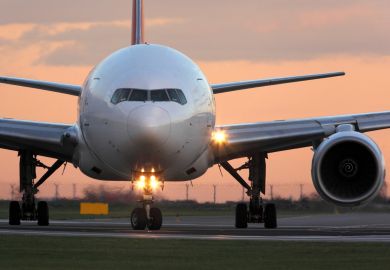In a recent post, Jürgen Gerhards outlined four steps for reducing academic air travel, citing the substantial carbon footprint of academic conference and committee globetrotting. All his recommendations could stand readily on this point alone.
Environmental protection is far from the only reason to critically re-evaluate academic travel culture, however. First as an independent scholar working in K–12 education, and now as a library worker amid staff often treated as peripheral to the production of new research, I have had many occasions to experience first hand the systemic barriers that exclude good scholars from the mainstream of scholarly communication.
In a recent essay for the Journal of Academic Librarianship, I examined how the costs of “literacy brokering” for non-native English speakers often exceed the costs of article processing charges (APCs) which are much more widely acknowledged (and condemned) as exclusionary.
In precisely the same fashion though, the cost (in travel, lodging, etc.) of presenting at a conference can easily exceed the €1,485 average APC cost.
Many contingent faculty, librarians, and others end up frozen out of conference participation, just as they are out of gold open access. The result is not just inhibiting academic careers, but impairing research.
As slow scholarship advocates note, good research takes time to mature amid feedback and refinement. When travel costs are prohibitive, and especially, when they are in direct competition with budgeting for APCs (which have a higher return on investment for building a CV), the incentive is for research to move directly from concept through to journal submission without the opportunities for incremental critique that conferences are meant to offer.
Reducing the cost of participation not only fosters greater socio-economic and professional diversity, but also deepens academic discourse and improves the quality of published research.
Yet, it would be a mistake to think that the challenges of academic travel can be addressed simply through giving more grants. Travel weighs heavily on many scholars for reasons quite apart from finances, such as being parents of small children and caregivers for ageing relatives. I belonged to the latter category, until recently, and still belong to the former.
When an internship with an academic publisher required me to go out of town for three days, it took its toll on my wife, who had to assume the burden of my usual household responsibilities and the entirety of childcare in my absence without family support (since, like most academic families, we are geographically displaced by job migrancy).
So short a time might seem a small inconvenience, but it came in the context of my regular 60+ hour work weeks at three jobs and my last semester of library school. Meanwhile my wife was working another 20 hours outside the home to save money for moving to my next job once my degree was finished.
This is not an unusual story among the academic precariat, and within that setting, the stress that three days’ absence can place on a spouse, a child, and a marriage is significant. Multiplying that times the conference schedule that serious career advancement demands quickly becomes unthinkable.
These burdens fall primarily upon women because, whether they are the wives of academics or are academics themselves, they are far more likely to be primary caregivers for relatives of all kinds and are generally responsible for a far greater share of the other domestic work that keeps a household together.
When we tie professional advancement in the academy to participation in conferences and on committees that require extensive travel, we are too often asking for what is simply impossible to give, either in terms of their own time or a spouse’s. This arrangement disproportionately favours those without family commitments, which is much more likely to mean men.
Just as there is a certain degree of myopia, if not outright hypocrisy, in our collective professional agitation for action on climate change, while maintaining our jet-set lifestyle, so too the continued reliance on conference and committee travel in the digital age discredits our claims to desiring greater gender equity.
And I am conscious that there are a wide range of other voices pushed to the margins by the demands of travel. I think of colleagues experiencing chronic illness or disability; or those whose travel schedules are limited by religious practices, either through explicit schedule conflicts with observances or through inability to sacrifice time away from family and local community service. I think of scholars facing travel bans such as those currently enacted by the US, or others who are being punitively denied passports by their own governments, or scholars living undocumented in host countries that they don’t dare to leave.
Meeting with others face-to-face has real value and there are times when there is no substitute, but modern technology is increasingly presenting suitable alternatives for the common exchanges of ideas.
Video conferencing and other virtual tools for collaboration can make the Earth greener, as Gerhards noted, but they can also make the academy fairer and more representative of the Earth’s inhabitants by simply offering an option for virtual participation alongside the choice for physical attendance.
If we want to practise what we preach, whether about the environment or about inclusion, it’s time to start preaching and practising from the comfort and convenience of our desks.
This piece was originally published on the LSE Impact Blog.
Race MoChridhe is a master’s of library and information science student at the University of Wisconsin-Milwaukee, an open access publishing intern for the American Theological Library Association, and a technician at the research library of the Minnesota Department of Transportation.
Register to continue
Why register?
- Registration is free and only takes a moment
- Once registered, you can read 3 articles a month
- Sign up for our newsletter
Subscribe
Or subscribe for unlimited access to:
- Unlimited access to news, views, insights & reviews
- Digital editions
- Digital access to THE’s university and college rankings analysis
Already registered or a current subscriber?




